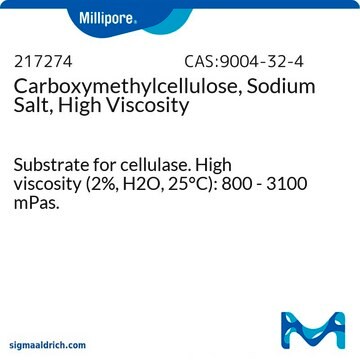추천 제품
일반 설명
Sodium carboxymethyl cellulose (CMC) is a class of linear structured cellulose which consists of polysaccharide composing the fibrous tissue of plants.
애플리케이션
CMC can be used for a wide range of application such as:
- food processing, textiles
- detergents, and drugs
- a stabilizer in the preparation of nanoparticles
- a binder for the fabrication of electrodes
Storage Class Code
11 - Combustible Solids
WGK
WGK 1
Flash Point (°F)
Not applicable
Flash Point (°C)
Not applicable
개인 보호 장비
Eyeshields, Gloves, type N95 (US)
이미 열람한 고객
Alan Ransil et al.
Nature communications, 12(1), 6494-6494 (2021-11-13)
Sodium trisilicate waterglass is an earth-abundant inorganic adhesive which binds to diverse materials and exhibits extreme chemical and temperature stability. Here we demonstrate the use of this material as an electrode binder in a lay-up based manufacturing system to produce
Silver nanoparticles as pigments for water-based ink-jet inks
Magdassi S, et al.
Chemistry of Materials, 15(11), 2208-2217 (2003)
In situ synthesis of polyaniline/sodium carboxymethyl cellulose nanorods for high-performance redox supercapacitors
Peng H, et al.
Journal of Power Sources, 211, 40-45 (2012)
Sodium carboxymethyl cellulose a potential binder for Si negative electrodes for Li-ion batteries
Li J, et al.
Electrochemical and Solid-State Letters, 10(2), A17-A20 (2007)
Lisa Miclotte et al.
Frontiers in microbiology, 11, 577474-577474 (2020-12-01)
The use of additives in food products has become an important public health concern. In recent reports, dietary emulsifiers have been shown to affect the gut microbiota, contributing to a pro-inflammatory phenotype and metabolic syndrome. So far, it is not
자사의 과학자팀은 생명 과학, 재료 과학, 화학 합성, 크로마토그래피, 분석 및 기타 많은 영역을 포함한 모든 과학 분야에 경험이 있습니다..
고객지원팀으로 연락바랍니다.





